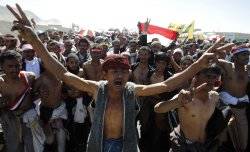Yemeni security forces killed several protesters in Sanaa after opening fire at a march against President Ali Abdullah Saleh, who on his part said he would go to the United States in order to allow an interim government to prepare for an election to replace him, but did not specify when he would leave.
Saleh, speaking to reporters after forces loyal to him fired at protesters demanding he face trial for killing demonstrators over 11 months of protests, said he had no designs on staying in power.
"I will go to the United States. Not for treatment, because I'm fine, but to get away from attention, cameras, and allow the unity government to prepare properly for elections," he said on Saturday.
"I'll be there for several days, but I'll return because I won't leave my people and comrades who have been steadfast for 11 months," he said. "I'll withdraw from political work and go into the street as part of the opposition’’.
Saleh also said the mass protest at his being granted immunity was a violation of a Gulf-brokered power transfer deal.
"This march is the biggest violation of the Gulf initiative," Saleh told reporters in Sanaa a few hours after the opposition accused his troops of attacking the protesters.
Forces reportedly killed at least nine protesters when they opened fire to stop the tens of thousands who set off from the southern city of Taiz on Tuesday for the 270km march to the capital.
The demonstrators, part of the "March for Life" rally, arrived in Sanaa in mid-afternoon on Saturday but were blocked in a southern suburb, witnesses said. Around 90 others were wounded, doctors told the Reuters news agency.
A medic, Mohammed el-Qoutbi, told the Associated Press people were injured by gunshots and tear gas after powerful Republican Guard forces cracked down on protesters demanding the outgoing president be put on trial.
Activist Waddad al-Dhalie said that a number of female protesters were also injured with bullets and tear gas.
No to immunity
Shots rang out as the activists entered the city chanting "No to immunity", said residents of Sanaa.
The protesters were referring to a deal granting Saleh immunity from prosecution for his part in a violent crackdown on months of demonstrations against his 33-year rule .
The immunity agreement, crafted by Yemen's wealthier neighbors in the Gulf Cooperation Council (GCC), was designed to ease Saleh out of power and avert civil war.
Police and soldiers deployed in force backed by armor, and used tear gas, water cannons and live ammunition to halt the marchers, whose ranks were swelled by residents of the capital.
Protesters, many of them young, chanted "For shame, the blood of the martyrs has been sold for dollars", referring to the immunity deal, which was endorsed by a coalition of opposition parties that are part of the interim government.
Witnesses said troops loyal to Saleh spread out across the entrances of streets leading to his compound to block any attempt by protesters to approach it. Later in the day, marchers retreated and headed towards Change Square, a rallying point for the protests which began in January, they added.
Tanks, troops and armored vehicles were deployed around the presidential compound.
Protesters want to purge the government of members of Saleh's family, who still hold key posts in the military and security forces .
Under the GCC deal, Saleh agreed to transfer his powers to his deputy. An interim government will prepare the country for an election to replace him in February, and has promised to separate pro-Saleh troops from militiamen loyal to tribal leaders and rebel army units in Sanaa and elsewhere.
If he goes, Saleh would be the fourth leader to surrender power after mass protests that have redrawn the political map in North African and the Middle East.
PHOTO CAPTION
Anti-government protesters shout slogans during a protest march from the southern Yemeni city of Taiz to the capital Sanaa December 24, 2011.
Aljazeera


 Home
Home Discover Islam
Discover Islam Quran Recitations
Quran Recitations Lectures
Lectures
 Fatwa
Fatwa Articles
Articles Fiqh
Fiqh E-Books
E-Books Boys & Girls
Boys & Girls  Hajj Rulings
Hajj Rulings Hajj Fatwas
Hajj Fatwas














